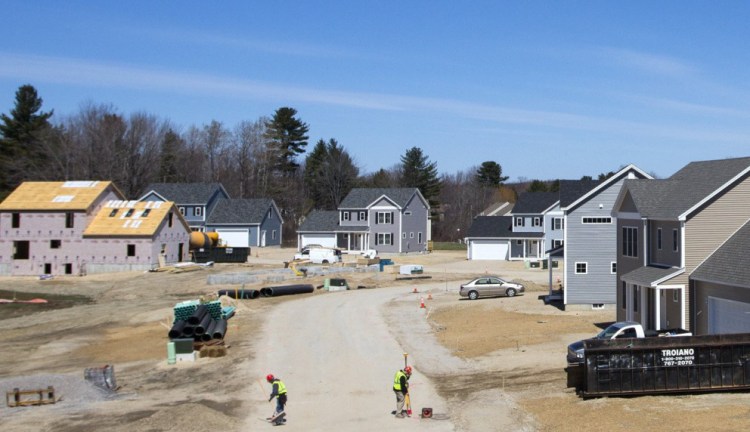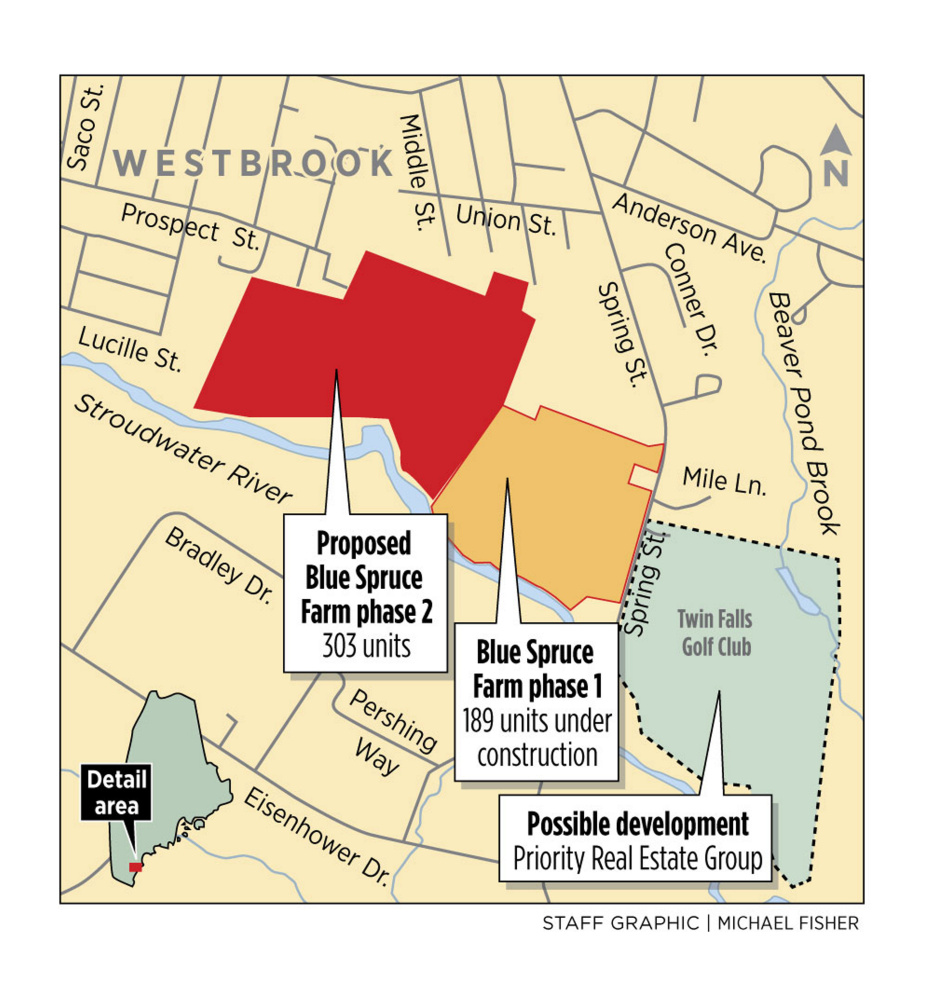A housing shortage in Portland has driven real estate developers into neighboring Westbrook, but residents of the smaller city are pushing back.
Nearly 200 single-family homes and apartments are already going up at Blue Spruce Farm on Spring Street. Earlier this year, the developer Risbara Bros. filed an application to extend that project by more than 300 units, mostly apartments. The Westbrook Planning Board is considering an application for 96 condominiums on Austin Street.
And while plans have not yet been filed with the city, developer Jim Howard of Priority Real Estate Group is considering a development of single-family homes at the 52-acre former Twin Falls Golf Club – across the street from Blue Spruce Farm.
If all of those projects are approved, more than 600 new housing units could be coming to Westbrook in the next two years.
Some Westbrook residents are alarmed at the rapid pace of construction and have banded together to request a moratorium on residential building permits, hoping to slow the pace of development and make changes to the city’s approval process.
“We’re joining forces as a community,” said Flynn Ross, who lives on Middle Street near Blue Spruce Farm. “People concerned about Austin Street, people concerned about Blue Spruce are working together because ultimately this all affects Westbrook.”
Home building in Greater Portland has climbed nearly to pre-recession levels, and Westbrook has become a hot spot for new homes, with permits issued for 370 new housing units so far in 2016. That figure is mostly attributable to Blue Spruce Farm; the two phases of that project combined would be the biggest development the city has seen. The last comparable subdivision was built in the 1960s and 1970s, when more than 200 single-family homes were built on East Bridge Street.
“With the pressure that’s on downtown Portland for housing, the natural place to look is on the outskirts of the city, but yet close enough that people could have a short commute to work,” said Howard, of Priority Real Estate Group.
Whether or not the Westbrook City Council approves the temporary stay, the community will need to decide how to handle two confluent trends – a squeeze on rental units in Portland, and a surge in new housing starts. The council, the planning board and the school committee will host a public meeting next week to discuss the idea of a moratorium and other concerns with residents.
“Is the city able to handle development? Yes,” City Administrator Jerre Bryant said. “Does it put pressure on things like schools and highways? Yes, it does.
“The regulation of growth is, to a great extent, a policy decision of the community.”
It was not clear how the new and proposed developments will affect homeowners’ property taxes. The current property tax rate for homeowners in Westbrook is $18.40 per $1,000 of assessed value, or $2,760 on a home assessed at $150,000.
Originally, Risbara Bros. planned on a three- to five-year build-out on the first phase. But buyers snatched up the 52 single-family homes more quickly than expected, and so far, the apartments have been spoken for, months before tenants arrive. So the company has moved forward on the second phase with 13 single-family homes, 40 condominiums and 250 market-rate apartments.
That area is zoned for high-density residential development, which Bill Risbara said made it attractive to his company.
“There was a pent-up demand,” Risbara said. “If I had them all available today, people would be looking for them today.”
Ross lives around the corner from Blue Spruce Farm, and she said her neighborhood balked at the size of the project.
“Phase 1, a lot of people were like, ‘Oh, OK, development’s coming, we knew that,’ ” she said. “Then, when Phase 2 was proposed, we were like, ‘Whoa, that’s a whole lot bigger.’ ”
So on dog walks and trips to the mailbox, neighbors traded research on the city’s code of ordinances. They attended public meetings. They formed a Facebook group called “Westbrook Citizens for Sustainable Growth.” When Tim Ly, the owner of MaineLy Property Management, submitted a proposal for 96 condominiums on Austin Street, the group found fellow concerned neighbors on the north side of town as well.
Residents had gathered more than 120 signatures for a letter to city officials as of Friday, requesting a 180-day stay on building permits for all subdivisions greater than 10 units. That condition wouldn’t slow other development, like the planned Dirigo Plaza with 500,000 square feet of retail space on a former quarry site near the Maine Turnpike. State law allows for such a moratorium.
In particular, they want the city to use that time to consider assessing impact fees on incoming housing. New housing will bring in more children and cars, but unlike some communities in the state, Westbrook does not charge developers for future strain on schools and roads.
“It’s wonderful that the city of Westbrook has had some really thoughtful, strategic planning and is an attractive place for people to live,” Ross said. “I think the schools have been improving and gaining reputation, particularly for music and arts. And so we need to be smart moving forward about residential planning.”
Ward 5 Councilor Michael Sanphy represents the Austin Street neighborhood, where he said Ly’s proposed condos would be “too far-fetched.”
“The scale is just too big,” he said. “If they had something smaller, I would maybe look at it.”
He would support a moratorium as long as it does not block commercial development or smaller residential projects.
“It’s a timeout,” he said. “We could go back to the planning board and talk about, are we growing too fast, and what’s the actual impact on the community? It’s going to have an impact – some positives, some negatives.”
Developers themselves were wary of the idea. Risbara called it “fear-mongering.”
“The city of Westbrook has made so many changes over the past 10 years to make Westbrook a more attractive place and to attract new residents,” he said. “To have a moratorium doesn’t make sense.”
After residents raised concerns about the look and number of condos, Ly said his team is making changes to their plans.
“As of right now, we’re going to push forward and try to develop the property,” Ly said.
Howard bought the Twin Falls Golf Club in June. The purchase price wasn’t yet available in city records, but the Cumberland County Registry of Deeds shows a mortgage for $900,000. Howard hasn’t drawn up formal plans for the city yet, but he said he will eventually build new homes on the former fairways. While he guessed the development could be between 40 and 70 single-family homes, he said he’s trying to understand the neighborhood’s preferences by observing the permitting process for Blue Spruce Farm.
“This is the Catch-22 going on,” Howard said. “Folks are screaming that we need affordable housing. Folks are screaming that we need any housing. Then you go to build the housing, and folks say that’s too much housing.”
The joint meeting is scheduled for 6:30 p.m. Aug. 22 at the Westbrook Performing Arts Center.
Send questions/comments to the editors.



